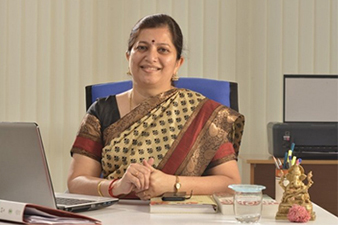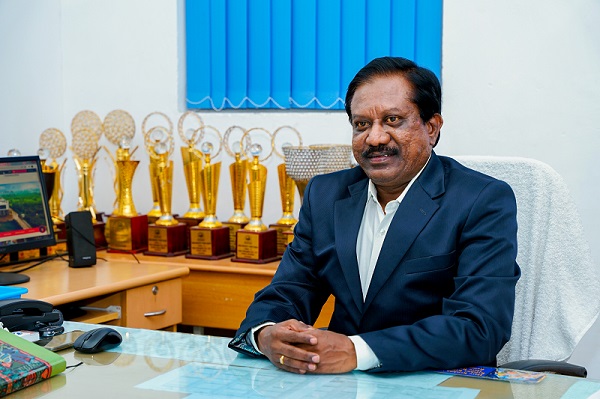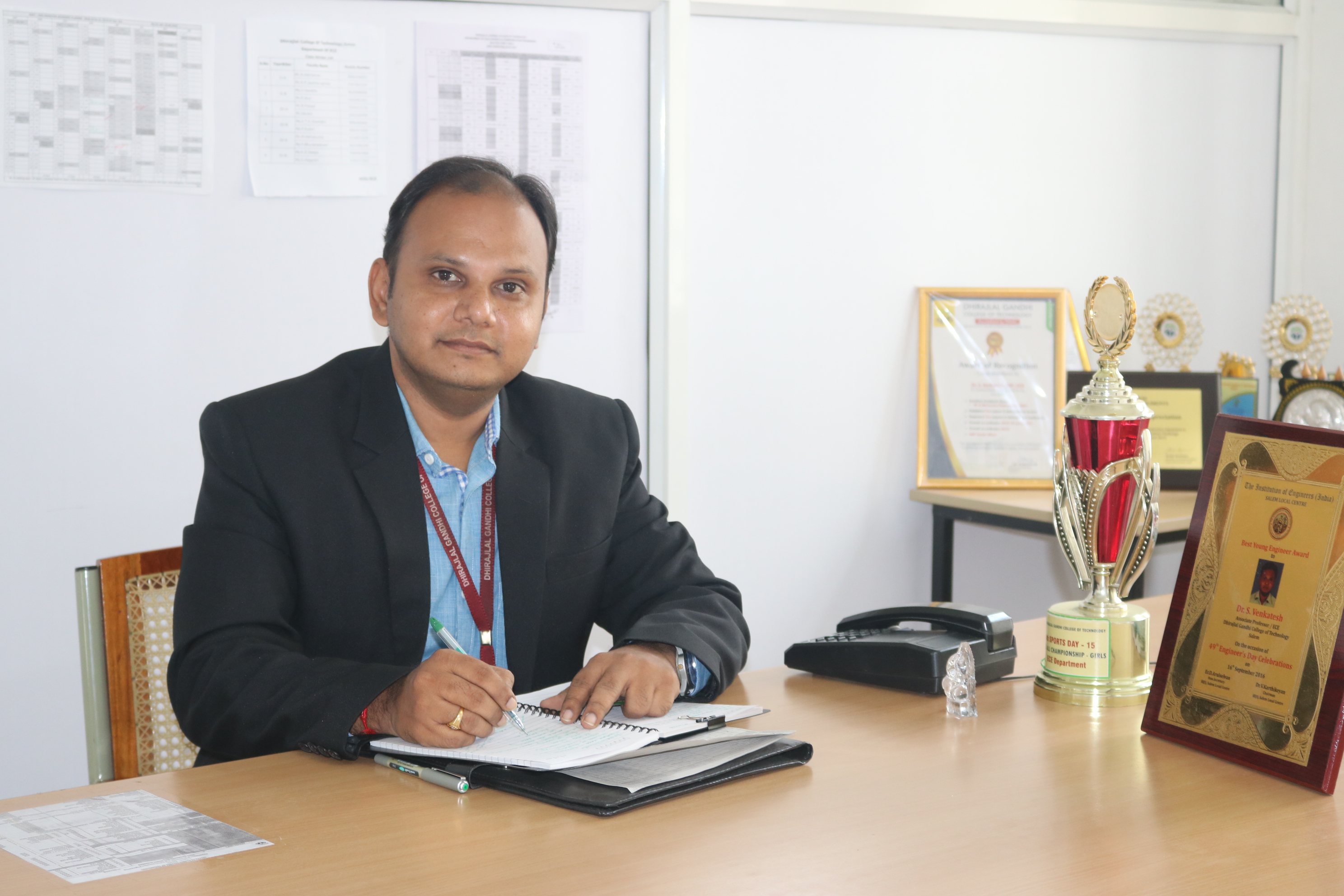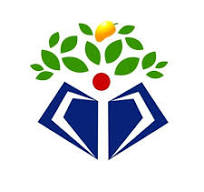DHIRAJLAL GANDHI COLLEGE OF TECHNOLOGY(AUTONOMOUS)
About the Institution
Dhirajlal Gandhi College of Technology (DGCT) was established in the year 2011 with a mission of creating conducive learning environment, where the students can explore new frontiers and expand their horizons enriched with professional ethics, values and can enhance their knowledge to participate in the challenges of advanced engineering fields and can make them as a good professional. The Institution has one of the best infrastructure facilities for an engineering college which facilitates the wholesome growth of students. DGCT boasts of 10.18 acres of lush green campus on Salem-Bangalore highway, near the Salem Airport providing the right ambience for students to pursue high level of technical education. The calm, serene and tranquil environment invigorates the mind and provide peaceful learning environment. The infrastructural facilities are the means for Academic Excellence, Research, and Entrepreneurship development and learning advanced technologies. It has always been one of the significant advantages of the institution. The college is approved by AICTE and is affiliated to Anna University, Chennai. DGCT received Nil Deficiency Report (NDR) for the past five years from the Anna University and AICTE since its inception.
VISION
To improve the quality of human life through multi-disciplinary programs in Engineering, architecture and management that are internationally recognized and would facilitate research work to incorporate social economical and environmental development.
MISSION
✔ To create a vibrant atmosphere that creates competent engineers, innovators, scientists, entrepreneurs , academicians and thinkers of tomorrow.
✔ To establish centers of excellence that provides sustainable solutions to industry and society.
✔ To enhance capability through various value added programs so as to meet the challenges of dynamically changing global needs.
About ECE Department:
The objective of the ECE department is to foster academic integrity with professional and social responsibility in students, to meet the exponentially growing requirement of practical design engineers in the country and abroad. The department has highly qualified, experienced and dedicated faculty members who have a strong commitment towards providing quality engineering education with high emphasis of electronic design aspects and to bring out quality research experience to the students in order to help them excel in current competitive scenario. Through initiatives like e-Yantra, TI lab, Tessolve lab, NI LabVIEW the department is shaping the future of engineering education and driving forward technological advancements that impact society on a global scale. Additionally, the Center for RF and Communication Systems serves as a focal point for research and innovation in the field of wireless communication. Through state-of-the-art facilities and collaboration with industry partners, the center supports cutting-edge research projects, trains students in advanced technologies, and facilitates knowledge exchange between academia and industry.
VISION
To cultivate creative, globally competent, employable and disciplined computing professionals with the spirit of benchmarking educational system that promotes academic excellence, scientific pursuits, entrepreneurship and professionalism.
MISSION
✔ To provide a congenial learning environment which fosters creativity and innovation among students.
✔ To conduct value based courses for improving technical competency.
✔ To encourage faculty to attend workshops, seminars, faculty development programs and engage them in continuous learning and to use innovative teaching methodologies.
✔ To impart moral values and inculcate moral and ethical behavior.
✔ To establish Centre of Excellence in emerging areas in the field of Communication Engineering.
✔ To undertake collaborative work with industry and institutes and provide solutions for societal challenge.
PROGRAM OUTCOMES (POs)
1. Engineering knowledge: Apply the knowledge of mathematics, science, engineering fundamentals, and an engineering specialization to the solution of complex engineering problems.
2. Problem analysis: Identify, formulate, review research literature, and analyze complex engineering problems reaching substantiated conclusions using first principles of mathematics, natural sciences, and engineering sciences.
3. Design/development of solutions: Design solutions for complex engineering problems and design system components or processes that meet the specified needs with appropriate consideration for the public health and safety, and the cultural, societal, and environmental considerations.
4. Conduct investigations of complex problems: Use research-based knowledge and research methods including design of experiments, analysis and interpretation of data, and synthesis of the information to provide valid conclusions.
5. Modern tool usage: Create, select, and apply appropriate techniques, resources, and modern engineering and IT tools including prediction and modeling to complex engineering activities with an understanding of the limitations.
6. The engineer and society: Apply reasoning informed by the contextual knowledge to assess societal, health, safety, legal and cultural issues and the consequent responsibilities relevant to the professional engineering practice.
7. Environment and sustainability: Understand the impact of the professional engineering solutions in societal and environmental contexts, and demonstrate the knowledge of, and need for sustainable development.
8. Ethics: Apply ethical principles and commit to professional ethics and responsibilities and norms of the engineering practice.
9. Individual and team work: Function effectively as an individual, and as a member or leader in diverse teams, and in multidisciplinary.
10. Communication: Communicate effectively on complex engineering activities with the engineering community and with society at large, such as, being able to comprehend and write effective reports and design documentation, make effective presentations, and give and receive clear
11. Project management and finance: Demonstrate knowledge and understanding of the engineering and management principles and apply these to one’s own work, as a member and leader in a team, to manage projects and in multidisciplinary environments.
12. Life-long learning: Recognize the need for, and have the preparation and ability to engage in independent and life-long learning in the broadest context of technological change.
.
PROGRAM EDUCATIONAL OBJECTIVES (PEO’S)
• The graduates of the program would have a successful professional career and engage in lifetime learning.
• The graduates will be able to work as a team or a team leader and exhibit professional and ethical behavior.
• The graduates will be able to understand, analyze the technical problems and provide suitable solutions.
PROGRAM SPECIFIC OUTCOME (PSO’S)
• Ability of the students to design and develop embedded solution for engineering applications.
• Ability of the students to design and implement communication sub systems.
Leaders of the DGCT

Secretary
Smt.Archana Manojkumar

Principal
Dr.A.SELVARAJ, M.E.,Ph.D, MISTE.,

